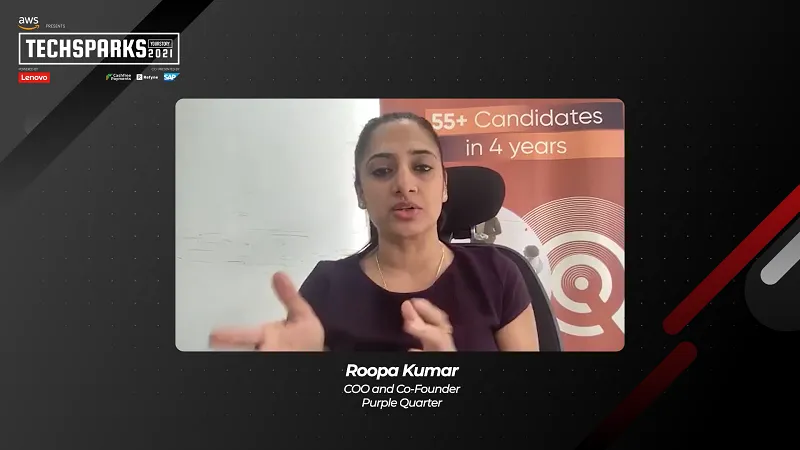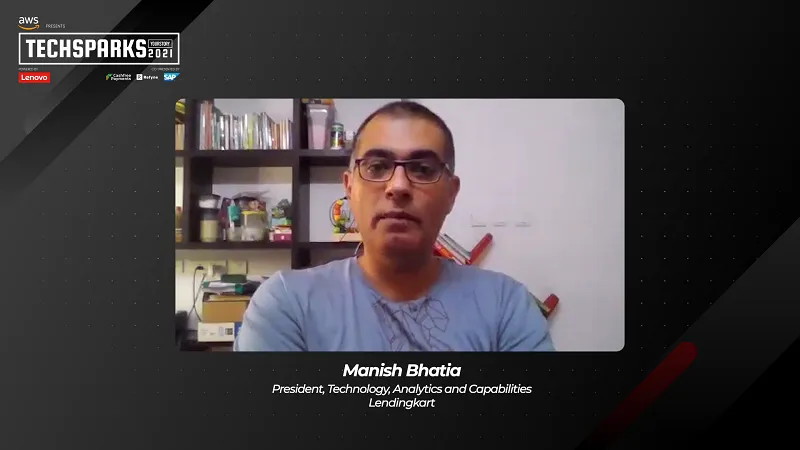Businesses are thinking tech-first to scale before getting bigger
On Day 5 of TechSparks 2021, CTOs from Lendingkart, Grab and Purple Quarter discussed how the importance of Chief Technology Officer (CTO) has changed over the years.
The definition of CTO has changed in the past few years. They have become an essential part of the top team in almost every organisation. In 2021, CTO does not simply stand for Chief Technology Officer–rather its Chief Transformation Officer–who proves to be the real enabler of the digital transformation in the businesses.

Manish Bhatia, Anshu Prateek, and Roopa Kumar in conversation with YourStory's Senior Anchor Shivani Muthana
In the 12th edition of startup-tech conference TechSparks, we had some of the noted CTOs of the Indian startup ecosystem delving deeper into the role of CTOs in the organisations. The panel had Manish Bhatia, President – Technology, Analytics and Capabilities, Lendingkart; Anshu Prateek, Head of Engineering, SRE and Databases, Grab; and Roopa Kumar, COO and Co-founder, Purple Quarter.
Shift in the consumer demand
As everyones’ lives are almost completely touched by technology, customers’ needs and choices also evolve. And technology, over the years, has changed according to customer preferences.
‘Tech is touching our lives magnanimously and the role of CTO has taken a huge amount of change due to this,” said Roopa. “Customers' preferences have changed and it brings tech closer to what a business mindset looks like,” she added.
There has been a shift from tech being a part of the business to being the business enabler, Anshu noted.
“Customer behaviour has changed fundamentally–especially during the pandemic. If you have more customers coming in, your tech will evolve. There‘s no right set of things you can deploy at one instance. At the end of the day, one needs to cater to the needs of the customer,” Manish noted.
Meeting the organisational needs
Tech has become an enabler when compared to before. Things have come down to how each company uses the technology to enable their business.
'Everyone's thinking tech-first in today’s date and time. Roopa highlighted that these days founders are looking at CTOs right at the beginning of the venture.

“It is important to understand the pain points–touchpoints and how the CTOs look at it. Unlike the old days, everyone wants to look at a CTO at the very beginning of their venture. Promising thing a startup needs to do is to look at scaling before they get there,” Roopa added.
She also added that it is important to know what each one is thinking and how the whole team can evolve in this.
According to Manish, a CTO has to have two aspects. They firstly need to understand the business. Secondly they need to plan around where they want to take the team to- every single decision needs to be in that direction. They need to have an end-to-end view.
Anshu added that everyone in the team needs to be on the same page when it comes to understanding the customers which involves all the stakeholders too. The CTO also needs to identify the secret sauce of the business.
Every organisation needs to understand the customers not just for the data points or the information but in terms of what they value and what their philosophy is, and serve them accordingly.
Understanding the business roadmap
In the Indian ecosystem, there are businesses that are tech enabled and there are small and medium businesses that are localised. However, everyone has to think about how they are going to grow their business.
Explaining more on this, Manish added: “One of the key characteristics of every business is to do more with less. This is where tech comes in. Tech gives the capability to scale without exponentially increasing your cost. It also gives you a reach on the discoverability of your business.”

Roopa also opined that people are more open to CTOs now. Businesses are willing to take a risk with tech hiring now - knowing how essential the role is for the company.
‘When (tech) hiring is a problem, how do we ensure we keep growing despite all problems is what needs to be answered. A CTO needs to keep an eye on what’s happening now and also an eye on what’s next,” Anshu added.
‘There is enough tech talent in India - it's about who wants to do what. It’s not about just joining a company, they should be aligned to that domain,’ said Roopa.
However, Roopa signed-off by highlighting that identifying the requirements and setting up the team is essential.
To log in to our virtual events platform and experience TechSparks 2021 with thousands of other startup-tech enthusiasts from around the world, join here. Don't forget to tag #TechSparks2021 when you share your experience, learnings, and favourite moments from TechSparks 2021.
For a line-up of all the action-packed sessions at YourStory's flagship startup-tech conference, check out TechSparks 2021 website.

Edited by Rajiv Bhuva









